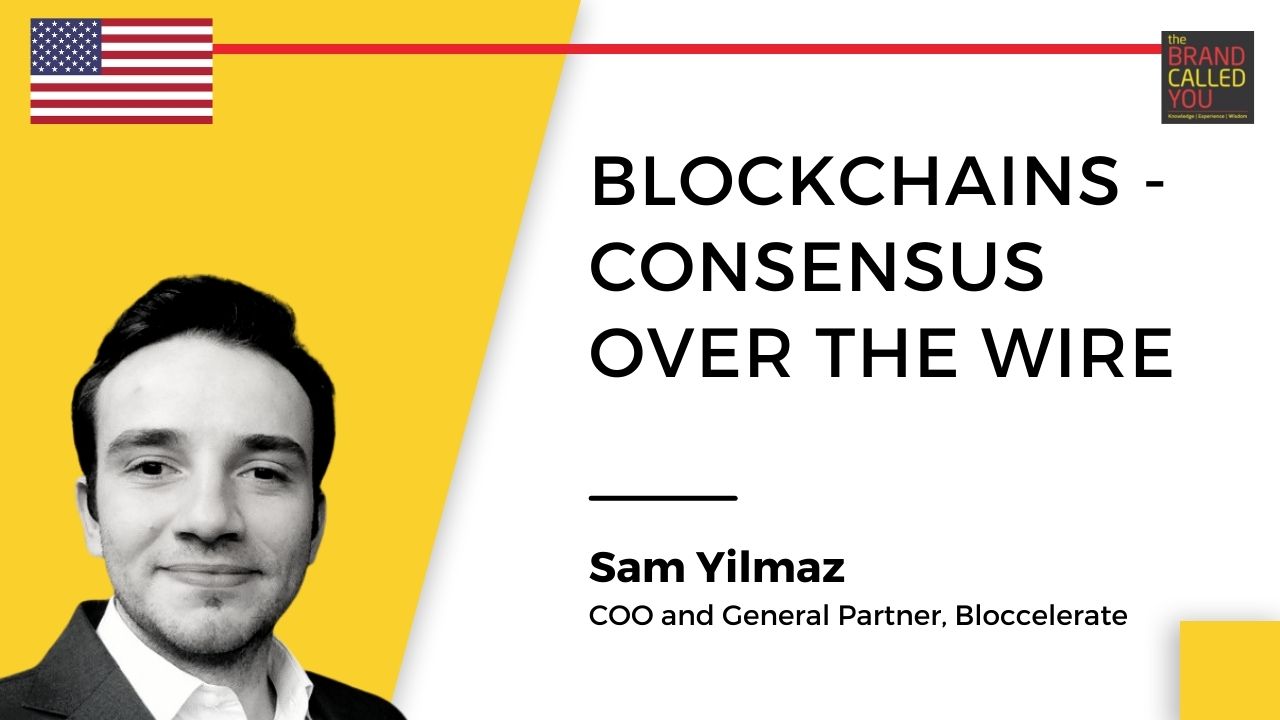Sam Yilmaz, COO and General Partner, Bloccelerate
Sam Yilmaz, is a tech entrepreneur. He is also the Chief Operating Officer and General Partner of a company called Bloccelerate. Sam is also a writer. His writings have been published too.
Podcast
Overview
One of the most heard words these days is Blockchains. This word is being used very frequently on news channels, social media, Youtube tech channels, etc.
What are these blockchains?
What kind of technology is it and how does it work?
Clear all your doubts on blockchains with us.
Our guest for today, Sam Yilmaz, is a tech entrepreneur. He is also the Chief Operating Officer and General Partner of a company called Bloccelerate. Sam is also a writer. His writings have been published too.
What is blockchain?
Sam says that if we think of emerging technologies over the course of history where we had over-the-wire technologies that were game-changers, we have electricity, which is power over the wire, then we had a telephone, which is voice over the wire, then we had internet which is data over the wire. Similarly, we have developed blockchains that are Consensus over the wire.
The benefit of having this consensus over the wire is that not only you can declare something, but you also recognize that everybody else would see the same version of the truth. Another benefit of the Consensus over the wire can be that even if the raw data propagated isn’t higher, the significance can be higher.
Sam tells us that he sees blockchains as a social technology that enables all of us to self-assemble, communicate and agree on asset identification and workflows.
About Bloccelerate
Bloccelerate is a Seattle-based venture that funds the early-stage blockchains-powered initiatives. Their aim is to back technology-driven entrepreneurs to bring blockchains to institutional and enterprise use cases.
What are Blockchains doing to improve transparency?
It enables us to commit messages that can be mined or put on chains which makes it immutable with some asterisks. It allows the viewers to see what has happened in the past and what is happening currently, which acts as a means of enhancing transparency.
How can blockchains be used by individuals, organizations, and smart governments?
Sam believes that whether the user is individual, corporate, or government, we need to bring assets on-chain, powers of particular identities on-chain, and processes on-chain.
Assets on Chain
Sam believes that no asset is real and there is no asset that is not real. Sam says that an asset is something that has some value attached to it. That value can be valuable if there is ownership. Ownership in itself is a social construct. So he believes that all the assets are social and not real, but also real. Sam says that we need not bring assets on-chain, but the ownership on-chain.
Powers and Identities on Chain
Sam affirms that we have done a good job in conceiving the means where the groups of identities can have signings sessions to execute certain events inside companies, governments, and social wallets, etc.
Processes on Chain
Sam believes that once we have assets and identities and their powers on-chain, then it is easy to conceive of bringing the processes on-chain.
Vulnerabilities of blockchains
Sam affirms that blockchains have a lot of security challenges. Governing access to one’s own assets with private keys can be complex to manage and might be easily compromised.
Talking about privacy challenges with blockchains, Sam says that the issue can be synonymity and the pseudonymity can be unlocked. By tracking launching activities, one can pair certain activities with certain identities.
How can one trust the accountability and accuracy of blockchains?
To understand this, Sam says that we first need to look at who has the power to propagate the transactions over blockchains and who will be the stakeholder who will need to use the data.
He says that if you are certain that there will be a transaction that will involve only the foreign stakeholders, then you can put that on chains and give the right access to the people you only want accountable.
You can set up your own network, and everyone who has the power to write a transaction will be brought into that network.
Profile
Sam Yilmaz, is a tech entrepreneur. He is also the Chief Operating Officer and General Partner of a company called Bloccelerate. Sam is also a writer. His writings have been published too.


